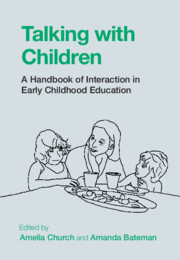Book contents
- Talking with Children
- Talking with Children
- Copyright page
- Dedication
- Contents
- Figures
- Tables
- Contributors
- Acknowledgements
- Notes on Transcription Conventions
- Introduction
- Part I Talk as Social Action
- 1 Conversation Analysis for Early Childhood Teachers
- 2 Sequences
- 3 Participation
- 4 Embodiment
- 5 Emotion
- 6 Socialization
- 7 Epistemics
- Part II Pedagogy in Interaction
- Part III Interaction and Inclusion
- Index
- References
7 - Epistemics
from Part I - Talk as Social Action
Published online by Cambridge University Press: 16 June 2022
- Talking with Children
- Talking with Children
- Copyright page
- Dedication
- Contents
- Figures
- Tables
- Contributors
- Acknowledgements
- Notes on Transcription Conventions
- Introduction
- Part I Talk as Social Action
- 1 Conversation Analysis for Early Childhood Teachers
- 2 Sequences
- 3 Participation
- 4 Embodiment
- 5 Emotion
- 6 Socialization
- 7 Epistemics
- Part II Pedagogy in Interaction
- Part III Interaction and Inclusion
- Index
- References
Summary
Epistemics in EMCA involves the examination of what people know, how they demonstrate their knowledge, and how they design their contributions to take into account asymmetries of knowledge. In this chapter, we investigate epistemic practices in a classroom in the children’s first year of schooling to illustrate the ways in which an EMCA approach can unpack real time trajectories of knowledge management, even in very busy classrooms.
- Type
- Chapter
- Information
- Talking with ChildrenA Handbook of Interaction in Early Childhood Education, pp. 142 - 162Publisher: Cambridge University PressPrint publication year: 2022



